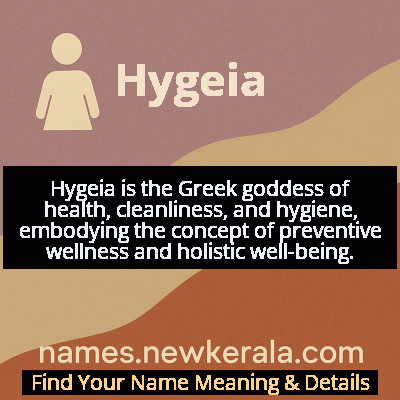Hygeia Name Meaning & Details
Origin, Popularity, Numerology Analysis & Name Meaning of Hygeia
Discover the origin, meaning, and cultural significance of the name HYGEIA. Delve into its historical roots and explore the lasting impact it has had on communities and traditions.
Name
Hygeia
Gender
Female
Origin
Greek
Lucky Number
1
Meaning of the Name - Hygeia
Hygeia is the Greek goddess of health, cleanliness, and hygiene, embodying the concept of preventive wellness and holistic well-being.
Hygeia - Complete Numerology Analysis
Your Numerology Number
Based on Pythagorean Numerology System
Ruling Planet
Sun
Positive Nature
Leaders, ambitious, highly driven, self-reliant, innovative.
Negative Traits
Overly aggressive, domineering, impatient, selfish.
Lucky Colours
Red, orange, gold.
Lucky Days
Sunday.
Lucky Stones
Ruby, garnet.
Harmony Numbers
2, 3, 9.
Best Suited Professions
Entrepreneurs, managers, engineers.
What People Like About You
Courage, determination, leadership.
Famous People Named Hygeia
Hygeia
Greek Goddess
Personification of health and hygiene, central figure in ancient Greek medical worship
Hygeia (Historical Figure)
Ancient Priestess
Key figure in Asclepeion healing temples, practiced ancient medical rituals
Hygeia Williams
Healthcare Advocate
Pioneered public health initiatives in developing nations
Name Variations & International Equivalents
Click on blue names to explore their detailed meanings. Gray names with will be available soon.
Cultural & Historical Significance
Extended Personality Analysis
Individuals named Hygeia typically embody characteristics of nurturing, organization, and preventive thinking. They often display natural caretaking abilities with a strong emphasis on maintaining balance and order in their environments. These personalities tend to be methodical and detail-oriented, approaching life with a systematic perspective that prioritizes prevention over reaction. Their strength lies in creating stable, healthy environments where others can thrive. Hygeia-named individuals often possess excellent intuitive skills, particularly in recognizing others' unspoken needs and potential health concerns. They are frequently drawn to professions involving healing, education, or community service, where their natural compassion and organizational skills can benefit others. Their approach to problem-solving is holistic, considering multiple factors and long-term consequences rather than seeking quick fixes. While they may sometimes be perceived as overly cautious or perfectionistic, their preventive mindset often helps avoid larger problems down the line. These individuals typically value knowledge, cleanliness, and balanced living, serving as pillars of stability and wisdom in their social and professional circles.
Modern Usage & Popularity
In contemporary naming practices, Hygeia remains an uncommon but meaningful choice, primarily selected by parents with interests in classical mythology, healthcare backgrounds, or those seeking unique names with positive connotations. While it doesn't rank on mainstream baby name charts, it has experienced modest growth among educated urban parents and within Greek communities worldwide. The name's usage extends beyond personal names to brand names for wellness products, medical facilities, and health-focused organizations. The global emphasis on public health during the COVID-19 pandemic brought renewed attention to the name and its associations. In professional contexts, 'Hygeia' frequently appears in medical literature, public health campaigns, and wellness branding. The name's rarity makes it distinctive while its positive associations with health and prevention give it enduring appeal. Modern usage often sees it paired with more common middle names to balance its uniqueness with familiarity, making it accessible while maintaining its classical dignity and significance.
Symbolic & Spiritual Meanings
Hygeia embodies profound symbolic meanings that transcend her mythological origins to represent universal principles of health and prevention. Her primary symbol - the serpent drinking from a bowl - has become the international emblem of pharmacy and medicine, representing wisdom, healing, and regeneration. This imagery symbolizes the continuous cycle of maintaining health through careful attention and preventive measures. Hygeia represents the fundamental truth that cleanliness, proper habits, and balanced living form the foundation of lasting well-being. Her symbolism extends to mental and spiritual purity, emphasizing that true health encompasses physical, emotional, and psychological harmony. In modern contexts, she symbolizes the public health principle that prevention is superior to cure, representing proactive approaches to life's challenges. Her legacy continues to influence contemporary healthcare, where the concept of 'hygiene' remains central to medical practice and public health policy. The name symbolizes holistic wellness, systematic care, and the wisdom of maintaining balance in all aspects of life, making her relevance eternal in both personal health management and societal well-being.

